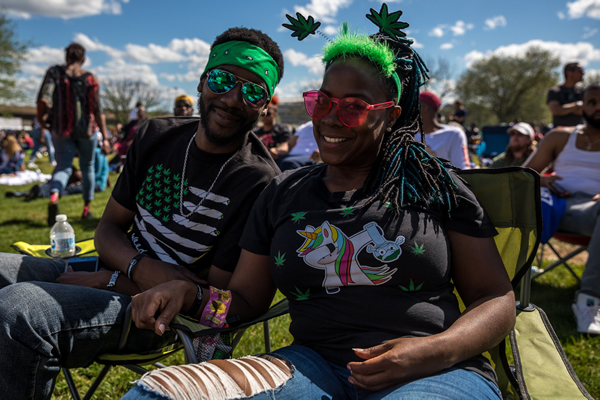Cannabis Culture (original) (raw)

Due to COVID-19, the National Cannabis Festival was moved to September. (Photo courtesy National Cannabis Festival)
National Cannabis Festival moved to Sept. 19
The fifth annual National Cannabis Festival, originally scheduled for April, has been postponed to Saturday, Sept. 19 at RFK Festival Grounds in Washington, D.C. The move was precipitated by the coronavirus pandemic.
Organizers have announced a full day of live entertainment, including Method Man & Redman, Young M.A., Backyard Band, Antibalas and the Archives.
In the meantime, organizers will host the Highstream 420 Festival on April 20. Visit nationalcannabisfestival.com for information on how to participate.
You must be 21 and older with valid government-issued identification to attend the National Cannabis Festival. The National Cannabis Festival was founded in 2015 by a group of cannabis enthusiasts to celebrate marijuana legalization across the country.
Cannabis advocate dies from COVID-19 in Colo.
COLORADO SPRINGS, Colo. — Charlotte Figi, who brought international attention to the use of CBD-dominant extracts as anti-seizure agents, has passed away due to complications related to the COVID-19 virus, according to multiple news reports. She was 13 years old.
Charlotte Figi suffered from Dravet syndrome, a rare and highly debilitating form of childhood epilepsy. After conventional therapies failed to stabilize her condition, her parents eventually experimented with the use of cannabidiol-rich extracts. The administration of CBD extracts was associated with a dramatic reduction in Charlotte’s seizure frequency, and her case was eventually profiled in 2013 in a widely viewed CNN documentary hosted by Dr. Sanjay Gupta.
Commenting on her untimely passing, NORML Deputy Director Paul Armentano said: “Charlotte Figi personalized this issue in a way that few others have, and her story humanized the medical cannabis fight to such a degree that many politicians could no longer ignore it. There is little doubt that Charlotte’s story emboldened lawmakers in several southern and mid-western states to finally move forward to recognize the need for CBD, and in some cases, whole-plant cannabis access.”
In June 2018, the U.S. Food and Drug Administration approved Epidiolex, a prescription medicine containing a standardized formulation of plant-derived cannabidiol for the explicit treatment of two rare forms of severe epilepsy: Lennox-Gastaut syndrome and Dravet syndrome.
2 of 5 dispensaries shut down in Iowa
DES MOINES, Iowa — Two of the state’s five licensed medical cannabis access facilities have shut their doors, according to media reports.
The closures leave only three operating dispensaries left in the state. Iowa has only one licensed cultivation center. According to the Iowa Department of Health, an estimated 4,300 are registered to access cannabis extract products. Under state law, those extracts must not contain percentages of THC in excess of three percent. Legislation advanced by lawmakers last year to remove the low-THC cap was ultimately vetoed by Republican Gov. Kim Reynolds.
Following the recent closures, Democratic state Sen. Joe Bolkom said: “Iowa has the most bureaucratic, expensive, and ineffective program in the country and it just got worse… More evidence is now in with two of our dispensaries essentially going out of business because it’s economically not feasible.”
Under the state’s access law, there can be no more than five licensed dispensaries operating in the state at one time.
Fewer vaping illnesses in states with legal cannabis
Bloomington, Ind. — Incidences of the vaping-related lung illness EVALI (e-cigarette or vaping product use-associated lung injury) are primarily concentrated to jurisdictions where adult-use cannabis consumption is prohibited, according to data published in the Journal of the American Medical Association (JAMA) Network Open.
Commenting on the findings, NORML Executive Director Erik Altieri said, “These findings come as little surprise. In jurisdictions where cannabis is legally regulated, consumers gravitate toward the above-ground retail marketplace where they can access lab-tested products manufactured by licensed businesses.”
He added, “Just like alcohol prohibition gave rise to the illicit production of dangerous ‘bathtub gin,’ marijuana prohibition provides bad actors, not licensed businesses, the opportunity to fulfill consumers’ demand – sometimes with tragic results.”
According to the U.S. Centers for Disease Control and Prevention, nearly 3,000 people have sought hospitalization because of the illness, which peaked last September, and nearly 70 people died as a result of it. In November, the CDC publicly identified vitamin E acetate – a diluting agent sometimes present in counterfeit, unregulated vape pen products – as a primarily “culprit” in the outbreak.
Writing on Monday in the journal JAMA Network Open, researchers affiliated with Indiana University reported that last year’s sudden outbreak of EVALI cases was not driven by either state-level differences or prevalence in e-cigarette use. Rather, they reported that cases “were concentrated in states where consumers do not have legal access to recreational marijuana dispensaries… One possible inference from our results is that the presence of legal markets for marijuana has helped mitigate or may be protective against EVALI.”
A previous analysis of EVALI prevalence in legal cannabis markets versus illegal markets by Leafly.com drew a similar conclusion.
In a statement to the online news site MedPageToday.com, the study’s lead author said that the team’s findings are “consistent with the hypothesis that people have demand for marijuana products, and in states where they don’t have access to them in this regulatory fashion, they end up purchasing them elsewhere.”
Cannabis Culture news in the Blade is provided in partnership with NORML. Visit norml.org for more information.